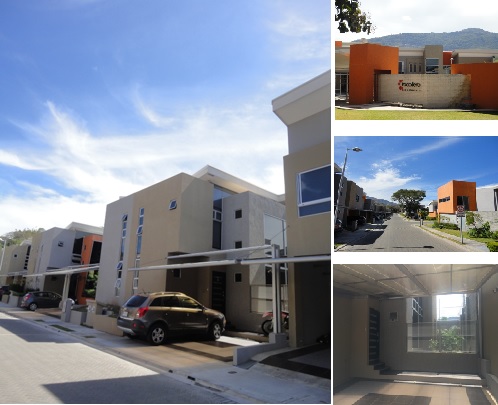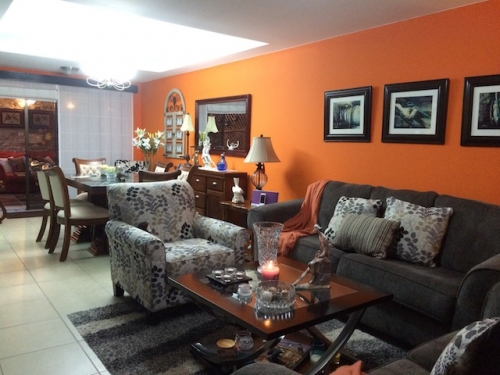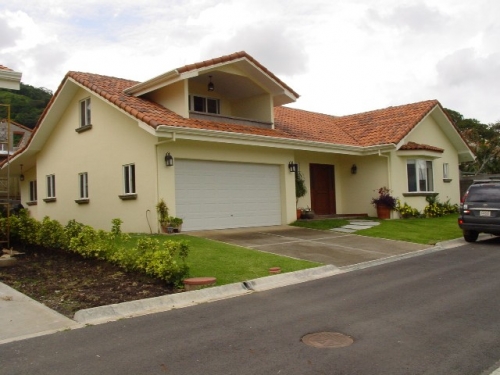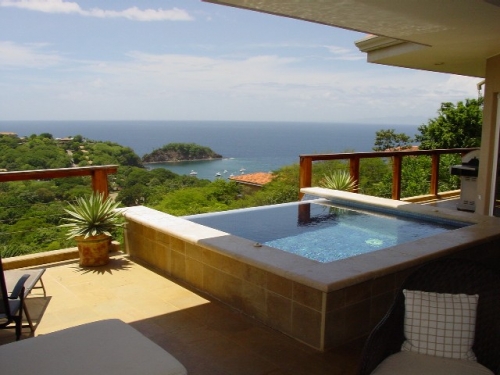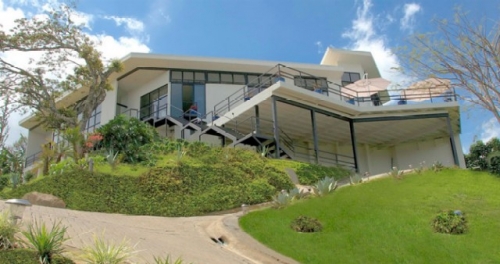Costa Rica Guide
Costa Rica Real Estate
List your property today!
Inclusion of real estate listings at Costa Rica Guide is
absolutely free of charge.
Featured Properties
Costa Rica Guide - Costa Rica Real Estate
Costa Rica lures Intel & Microsoft
April 2, 1998
SAN JOSE, Costa Rica -- When Intel Corp. started scouting abroad for a site for a computer-chip factory, this tiny nation, whose economic mainstays are tourism and bananas, wasn't even on the list.
But less than three years later, a $500 million chip complex is taking shape up the road from a coffee plantation here, the biggest single foreign investment in the country's history. And the notion that Costa Rica could eventually position itself as Latin America's "high-tech capital," as government officials put it, doesn't seem all that far-fetched.
Its efforts thus far have earned its capital city a new name, "San Jose South," in a wistful nod to San Jose, Calif., the heart of Silicon Valley. Technology companies have plunked down hundreds of millions of dollars in new investments here. Among them are Taiwan's Acer Group, Microsoft Corp., Motorola Inc., DSC Communications Corp. and Sawtek Inc. Lucent Technologies Inc. is negotiating a deal for production facilities, according to government officials. From its new factory, Intel plans to export $1 billion in chips in its first year, scheduled to start this summer. That alone is about a third more than what Costa Rica earns from tourism.
The government's business pitch emphasizes that English courses are mandatory for all Costa Rican students. It is setting up a nationwide network of computer labs in high schools and universities. Costa Rica has a literacy rate topping 94%, an educated work force with 12,000 engineering students, and one of the highest rates of computer usage in the hemisphere after the U.S. and Canada.
STRATEGIC VISION
President Jose Maria Figueres, whose four-year term ends this May, has figured prominently in the pitch sessions. "Figueres was extremely enthusiastic explaining ... his strategic vision about the mutual benefits that his country and technology companies like Microsoft can get by investing" there, Microsoft Chairman Bill Gates says by e-mail.
A few months after Mr. Gates met Mr. Figueres at a conference in March 1997 in Miami, Microsoft signed a five-year deal with Costa Rica. The project, says Michael Hard, a Latin America director for Microsoft, will help Costa Rica set up a national "digital nervous system" for government ministries, jump-start a software industry and wire the nation's health and school systems. The deal is "a blueprint for what other nations, not only in Latin America, but all around the world, are starting to talk to us about," Mr. Hard says.
Mr. Figueres's departure from office is unlikely to slow the interest in new investments. Though the president's earlier moves to pare down state spending were immensely unpopular, Mr. Figueres's push for technology investments has received widespread support.
Miguel Angel Rodriguez, Costa Rica's next president and a member of the opposition Christian Social Unity Party, criticized some of Mr. Figueres's spending cuts. But he has also publicly supported the technology strategy.
That strategy emerged in part after the Costa Rican Investment and Trade Development Board, or Cinde, urged the government to avoid a scattershot way of attracting investment to a developing nation, and suggested focusing on a sector in which Costa Rica had a competitive advantage.
ECONOMIST'S THEORIES
Brizio Biondi-Morra, director of Incae, a top Latin American business school outside San Jose, suggested that Cinde and government officials talk to economist Michael Porter, who teaches at Harvard Business School. Mr. Biondi-Morra, who attended Harvard Business School, considers Mr. Porter his mentor and is a believer in Mr. Porter's theories that the focused development of industrial "clusters" can spur faster and more sustainable economic growth.
Soon, Mr. Porter had the ear of Mr. Figueres, and Incae had founded the Latin American Center for Competitiveness and Sustainable Development to promote the same ideas. Now Central America's presidents meet every six months to discuss how to develop investment clusters individually and as a region.
Mr. Figueres asked Cinde for help in persuading a high-profile technology company to invest. Cinde representatives called hundreds of U.S. technology companies. In October 1995, they got a lead: Intel, the world's largest maker of computer chips, wanted to build a new chip assembly and testing plant.
Mr. Figueres and Cinde shifted into overdrive, with Cinde officials going to Mr. Porter's office in Cambridge, Mass., for last-minute advice on one of their first presentations to Intel. "They discovered that we had planned some preliminary visits to places like Mexico, Brazil and Chile," recalls Bill Calder, an Intel spokesman. "So they convinced us that on the way to Brazil we should make a quick stop in Costa Rica."
CUMBERSOME BUREAUCRACY
Intel was initially reluctant. "The big negative was that it was still a very small country and we were concerned that we'd overwhelm them," says Chuck Pawlak, who was Intel's point man in negotiations with Costa Rica as director of real estate and site selection. Also among Intel's concerns, says Mr. Calder were Costa Rica's often cumbersome bureaucracy and, to a lesser degree, high wages compared with other developing nations.
Mr. Figueres "would be putting notes into his computer when we spoke to him in his office," says Mr. Pawlak. "We've been to many countries where the top officials have never had a computer in their life." Costa Rican officials cut no deals for Intel that they couldn't also arrange for other foreign companies looking to set up shop, according to an independent report on the negotiation process by Incae. "For the establishment of Intel in the country, no law was modified, nor any of the requisites for any law."
One major glitch involved utility rates. Because Costa Rica had never had an investment of such a size, there was no official regimen for lowering rates for heavy-industrial projects. Mr. Figueres agreed to help push through a generic industrial rate structure for large-scale industrial projects that meant a 50% cut in electrical rates for Intel and any other large projects.
ENVIRONMENTAL WORRIES
Environmentalists were concerned with the impact of the Intel plant, especially when it came to the disposal of toxic industrial waste. Costa Rica didn't have the facilities to process the refuse. So Costa Rica reached an agreement with the U.S. to permit U.S. companies to re-export the waste to the U.S., where their own contractors could process it.
Another obstacle: Costa Rica's universities weren't producing enough of the engineers that Intel and other technology companies would need, Mr. Pawlak says. "They said they needed our help to set up the curriculum" to produce workers that could be "used by any high-tech company. They were chomping at the bit to make it happen." So Intel agreed to advise Costa Rica on what courses it needed to add, even offering to send employees to help teach them.
Costa Rica has also become a foreign base for companies like Acer, Taiwan's largest exporter and the world's seventh-largest personal-computer maker, which established a customer-service center near San Jose with a $25 million satellite communications system in 1995. When Acer customers in the U.S. call the help line, they get answers from one of 500 Costa Ricans, or Ticos, fluent in English and the intricacies of Windows.
Costa Rica is still moving slowly in other areas, such as privatization and reducing government spending. The country needs major investments in its crumbling roads and highways. But the technology investments have been a help. Economic growth is likely to top 3% this year, according to local economists, after shrinking nearly 1% in 1996.
Says Mr. Figueres: "Now we want to be competitive on a world basis, not on a Latin American or Central American basis."
Copyright 1998 Dow Jones & Company, Inc. All Rights Reserved.
Note: The above information is not to be used for any other purpose other than private study, research, criticism or review. Thank you.

